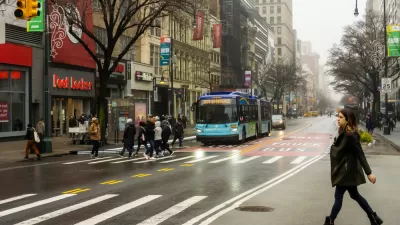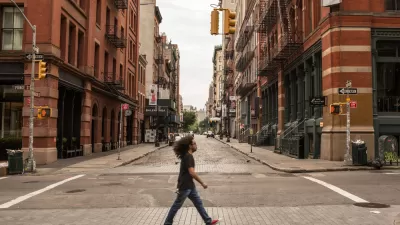Preferences in the characteristics of communities—from the shape of the built environment to demographics—reveal stark partisan preferences. Planners are faced with the task of navigating ideological divides.

"Republicans and Democrats express sharply different preferences about their ideal communities and house sizes," writes Bradley Jones to explain research from the Pew Research Center. "And while large numbers of people in both parties say it is important to live in a community that is a good place to raise children, partisans diverge on whether it is important that a community is racially and ethnically diverse."
Some of the distinctions in partisan preference can be boiled down to planning considerations implemented by zoning codes, according to Jones:
Nearly two-thirds of Republicans and Republican-leaning independents (65%) say they would prefer to live in a community where houses are larger and farther apart, but schools, stores and restaurants are several miles away.
By contrast, a majority of Democrats and Democratic leaners (58%) would rather live in a community in which houses are smaller and closer to each other, but schools, stores and restaurants are in walking distance.
The Pew research Center conducted a survey in September 2019 to produce the findings. More details on the methodology and the findings are available in the source article.
FULL STORY: Big houses, small houses: Partisans continue to want different things in a community

Planetizen Federal Action Tracker
A weekly monitor of how Trump’s orders and actions are impacting planners and planning in America.

Congressman Proposes Bill to Rename DC Metro “Trump Train”
The Make Autorail Great Again Act would withhold federal funding to the system until the Washington Metropolitan Area Transit Authority (WMATA), rebrands as the Washington Metropolitan Authority for Greater Access (WMAGA).

The Simple Legislative Tool Transforming Vacant Downtowns
In California, Michigan and Georgia, an easy win is bringing dollars — and delight — back to city centers.

The States Losing Rural Delivery Rooms at an Alarming Pace
In some states, as few as 9% of rural hospitals still deliver babies. As a result, rising pre-term births, no adequate pre-term care and "harrowing" close calls are a growing reality.

The Small South Asian Republic Going all in on EVs
Thanks to one simple policy change less than five years ago, 65% of new cars in this Himalayan country are now electric.

DC Backpedals on Bike Lane Protection, Swaps Barriers for Paint
Citing aesthetic concerns, the city is removing the concrete barriers and flexposts that once separated Arizona Avenue cyclists from motor vehicles.
Urban Design for Planners 1: Software Tools
This six-course series explores essential urban design concepts using open source software and equips planners with the tools they need to participate fully in the urban design process.
Planning for Universal Design
Learn the tools for implementing Universal Design in planning regulations.
Smith Gee Studio
City of Charlotte
City of Camden Redevelopment Agency
City of Astoria
Transportation Research & Education Center (TREC) at Portland State University
US High Speed Rail Association
City of Camden Redevelopment Agency
Municipality of Princeton (NJ)





























